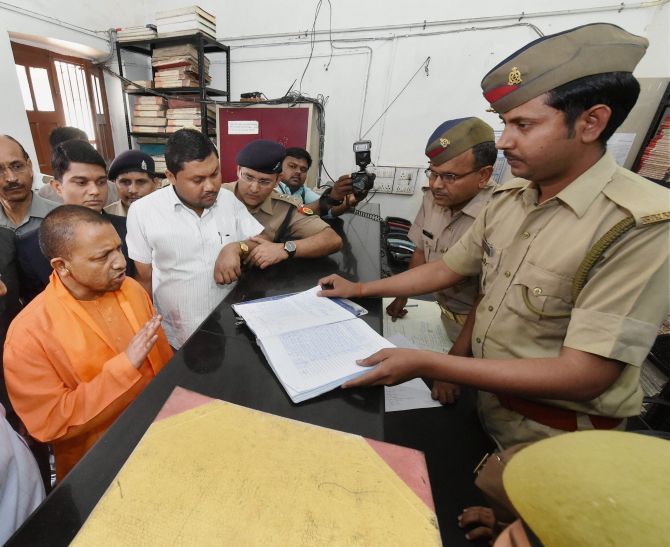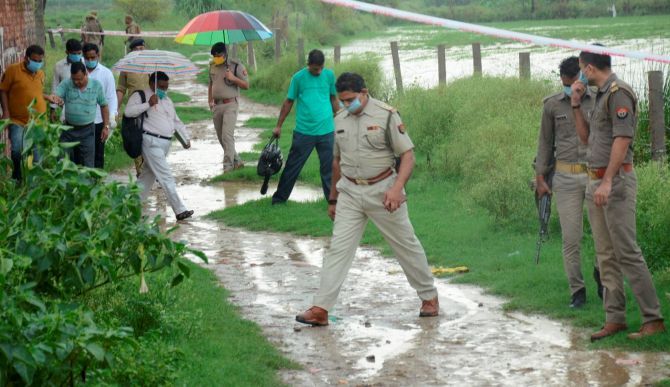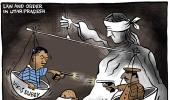'When Yogi took over, in the first few months he went after the criminals.'
'Everybody thought he will do it, cutting across party, caste divisions.'
'Gradually, the situation started slipping out of his hand.'

"The Vikas Dubey episode starkly reminds us that not only has this (neta-criminal) nexus not broken, but has gained in strength in the last three-and-a-half years because of considerations like caste. If the criminals belong to a particular caste or if he belongs to a particular party, then he is no more a criminal," Dr Surya Pratap Singh, a retired IAS officer and social activist, tells Rediff.com's Prasanna D Zore in the final segment of a revealing multi-part interview:
- Part 1: 'Vikas Dubey thought nothing would happen to him'
- Part 2: 'For every gang, the financier is the kingpin'
When the Yogi Adityanath government was formed, the people of UP believed he would take on organised crime, the hardened criminals.
How, according to you, is the law and order situation in UP under the present chief minister compared to what it was under earlier chief ministers Mayawati and Akhilesh Yadav?
It is really bad. It has gone worse (under this government).
People really had high hopes from the government when it came to power in 2017, and it had a huge majority.
People really had very high expectations from this government, but they could not do it (crack down against organised crime).
It's so unfortunate, in spite of such a huge mandate, and people's support who believed that Yogi is an honest person, and he would do it.
But it now feels like Yogi proved himself as a bull in a China shop. He was just going around and didn't know the outcome of his actions (the controversial encounters that took place in UP in the first year of his coming to power).
That's my perception. I too had very high hopes, but the perception after three-and-a-half years has changed.
Initially when he took over, in the first few months he went after the criminals.
He had a free hand and everybody thought he will do it, cutting across party, caste divisions. But what happened gradually, the situation started slipping out of his hand.
The situation now is such that the whole system of governance has collapsed due to the conniving and deep-rooted nexus among the police, bureaucrats, criminals and politicians, which we thought that Yogi would break.
The Vikas Dubey episode starkly reminds us that not only has this nexus not broken, but has gained in strength in the last three-and-a-half years because of considerations like caste.
If the criminals belong to a particular caste or if he belongs to a particular party, then he is no more a criminal.
The partisan attitude of the system to catch the criminals has sent a strong signal to them that they can live by switching their political allegiance.
When the system sends such signals, it emboldens criminal elements.
The criminals in UP have become very sharp and astute.
They don't owe allegiance to any political party; they owe their allegiance to the government of the day and by default whichever party is the ruling party.
If he is on the other side of the table, then they are dispensable. That kind of signal has been sent by the system to the criminals.
And that is what even the police and bureaucrats are following.
The moment you start doing it, you start losing the trust of the people in the system and even if they are victimised, they hesitate to go to the police thinking that the police and the system will always side with the criminals and gangsters.
The same thing has happened in Chitrakoot where a large number of girls have been molested by the contractors in the mining area there.
These kinds of incidents where the police tries to hide the crimes doesn't leave a good impression on the people.
Victims of such crime understand this system very well that the government is trying to hide bitter facts.

As you point out, the criminal doesn't belong to any political party; the criminal belongs to the government. Is that what happened after the first few months of the Yogi Adityanath government coming to power?
When the government starts changing, the criminals sense it quickly.
For the criminals belonging to higher and upper castes, it was easier to cosy up with this government.
The upper castes are their vote bank. It was easier for them to get hold of a local MLA or MP or a local influential party person, and seek protection from the system.
That's what happened; the majority of those criminals belonging to the upper castes changed their allegiance to the BJP, and then the government became helpless because they are the vote banks.
In the rural areas, these gangsters would influence voters and seek favours and protection from the local politicians.
People normally get swayed away by these bahubalis (strongmen). People really don't vote by choice. They either vote on caste lines or get influenced by a powerful person in the village.
They understand such opportunities better because criminals are criminals. They can't survive without their source of income.
So they need income, so they need that contract, they need to influence the engineers, they need to exert pressure on local industries and extort money from them to share part of the bounty with the ruling party.
Do you think Adityanath now intends to repair the law and order machinery in UP?
The mood in UP, one would assume, would naturally be in favour of finishing off the bahubalis.
Initially, when he took as chief minister, the party (the BJP) was very supportive of his actions against the organised mafia. And he went all out after them.
Gradually, he started realising that the party is full of the same elements.
Almost all the criminals changed sides and joined his party. And he knows that because he is a politician.
He knows that votes are important to win and criminals guarantee votes and victories.
So, saying that he is a gentle man or an honest person and he really wants to do it (finish organised crime), it will be a far cry. I won't buy this idea.
I also believed he would do it, but now I have started realising that Yogi Adityanath is not helpless.
He is knowingly overlooking the activities of criminals. The anti-Romeo squads that he started are no more. He banished them because he knows it sent wrong signal to the youth. They don't like it.
Slowly, he's losing his grip over the system.
At the same time, the legal system, the administration, the bureaucracy and cops have realised that he doesn't mean what he says.
Everything is in shambles now and things are going out of his hands.
I will not say he is helpless. He is more like the same kind of breed of politicians, which we thought he is not.
I really don't have high hopes for him now.
People are really angry with him; they are not in favour of Adityanath now. They were initially saying that he is a great politician and a honest person; but the way things are going on now, he is losing people's faith.
The crime rate against women in UP is the highest in this country. During the time of the SP and BSP, there used to be 14 rapes per day. Today, it is not less than 14; it is even more.
There would be 15 murders per day during the earlier regimes; it is way more than 15 today; nothing has changed.
People have realised that Yogi made tall claims, but when push came to shove, he could not walk the talk.
Law and order is really bad in UP today; this instance (the Vikas Dubey incidents) has really exposed the whole system.
I had been part of the system, but in the last 10-15 years, law and order has gone down the drain.
Who is responsible for this situation in UP?
All of us; all our systems, Systems means what?
The bureaucracy has succumbed to politicians for their petty interests.
The IAS and IPS, which are the part of the system, which are the backbone of the system. They have made this system in such a way that it becomes easier to be accountable to a politician, rather than be accountable to the people.
Being accountable to the people requires lot of effort, but being accountable to a politician, you just have to please one person and the problem is solved. You stay in that state, on your feet.
So, the system has collapsed and it suits both the politicians and bureaucrats.
In a democracy, a politician is at the helm of affairs. And politicians are supposed to be a check on the bureaucracy and vice versa.
What has happened is both have joined hands and manipulating the system to their advantage.
It started 10-15 years ago in this state; it may have existed earlier too, but the scale has grown huge today. It has reached a point of no return.
Feature Production: Aslam Hunani/Rediff.com











 © 2025
© 2025